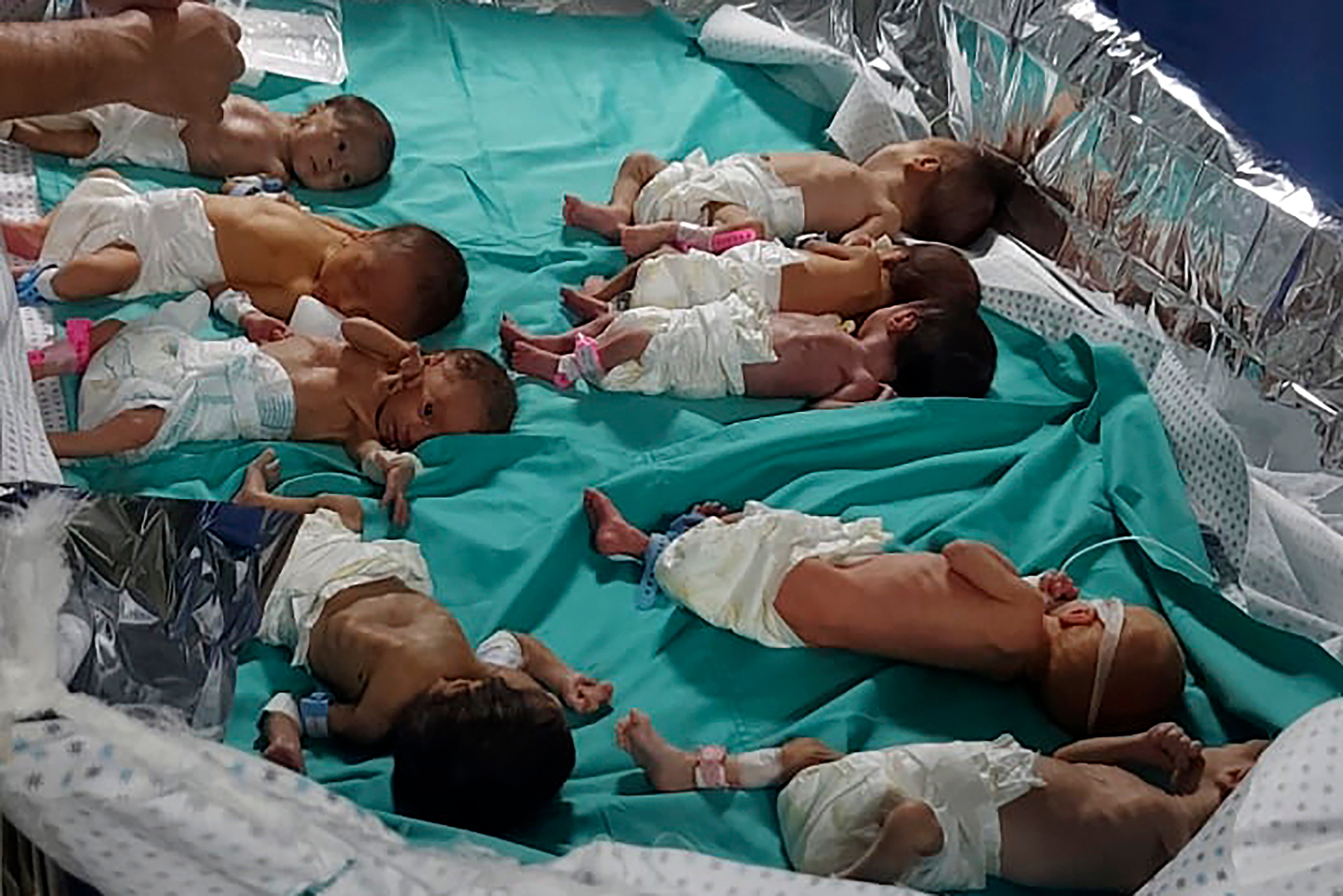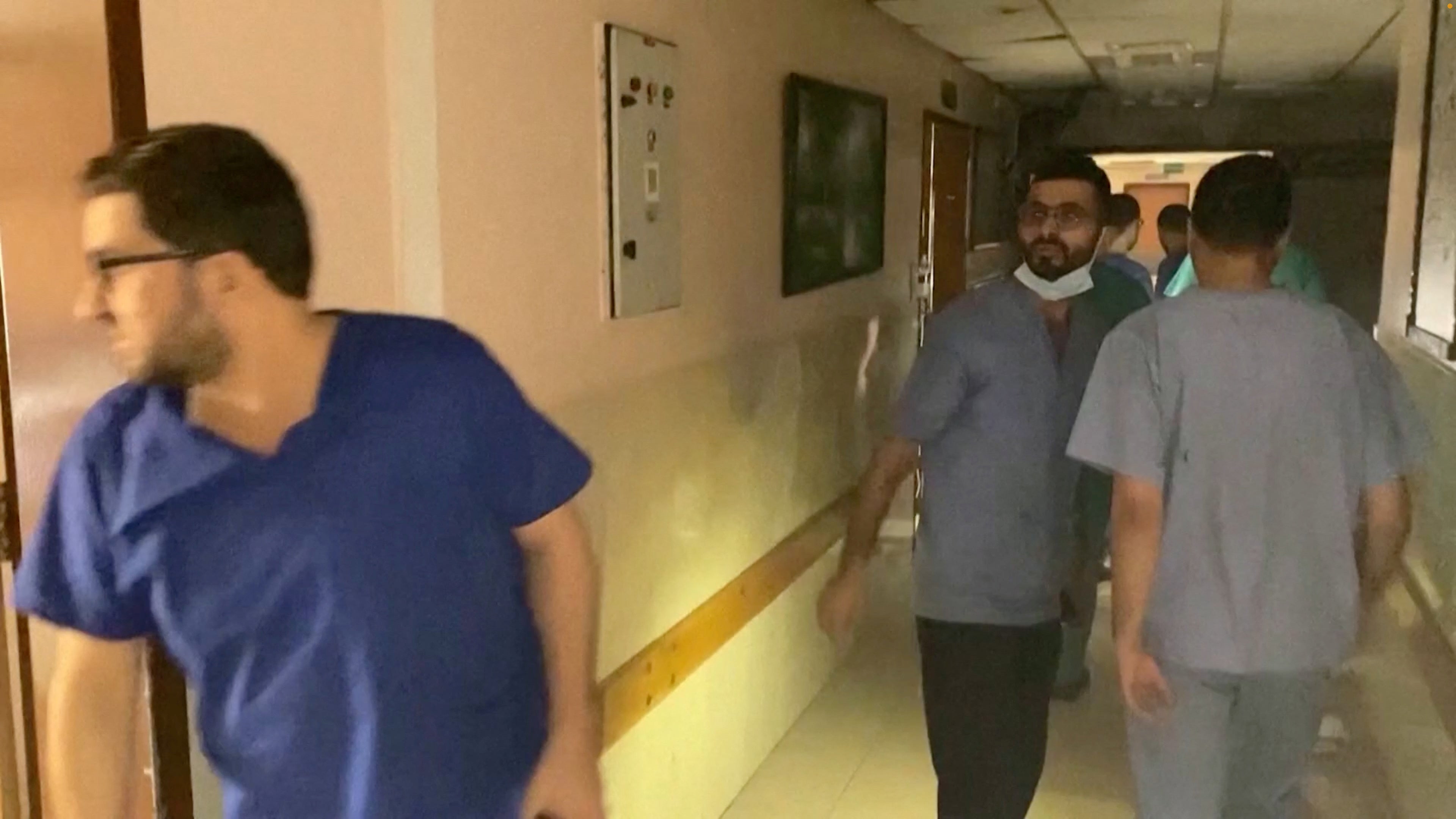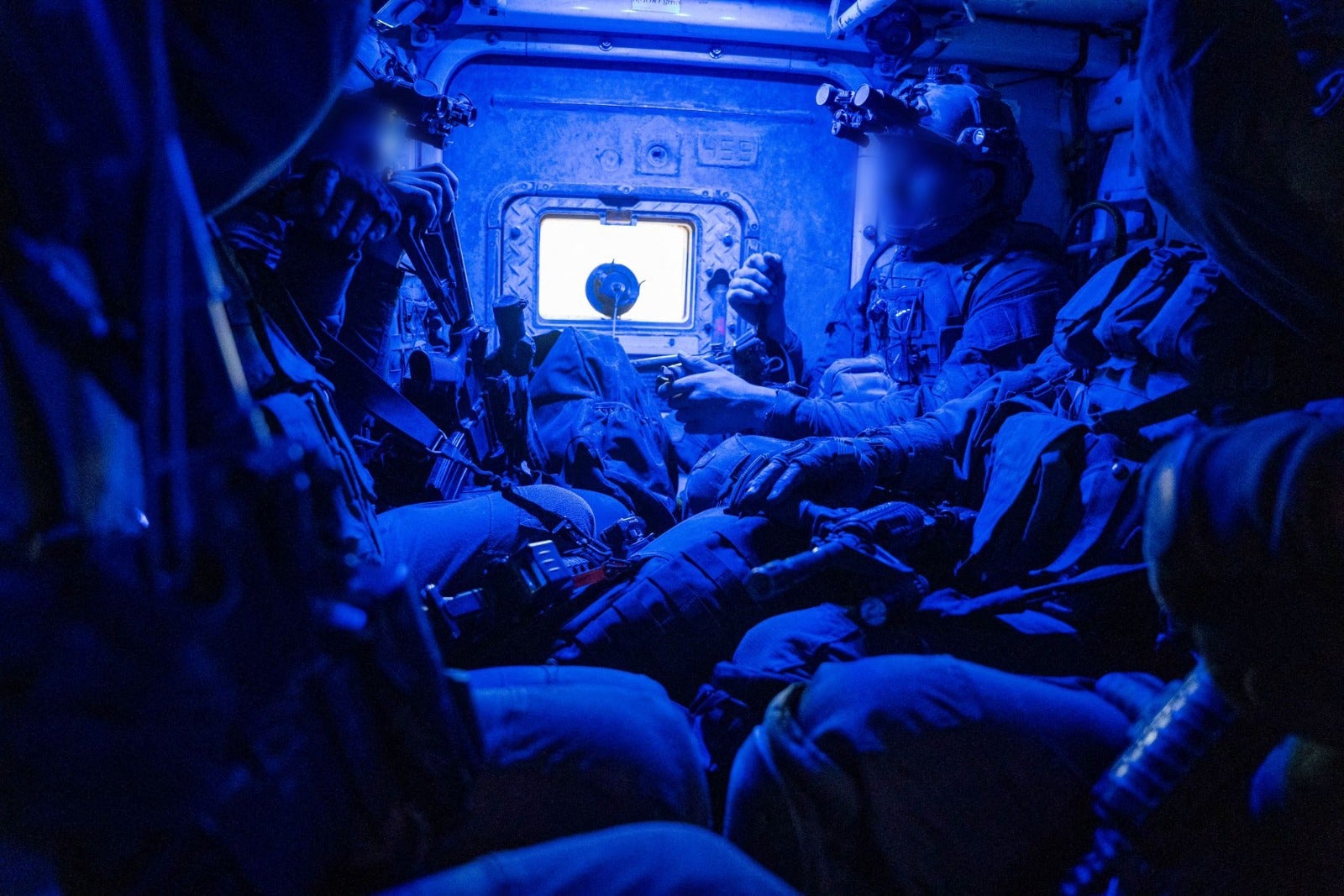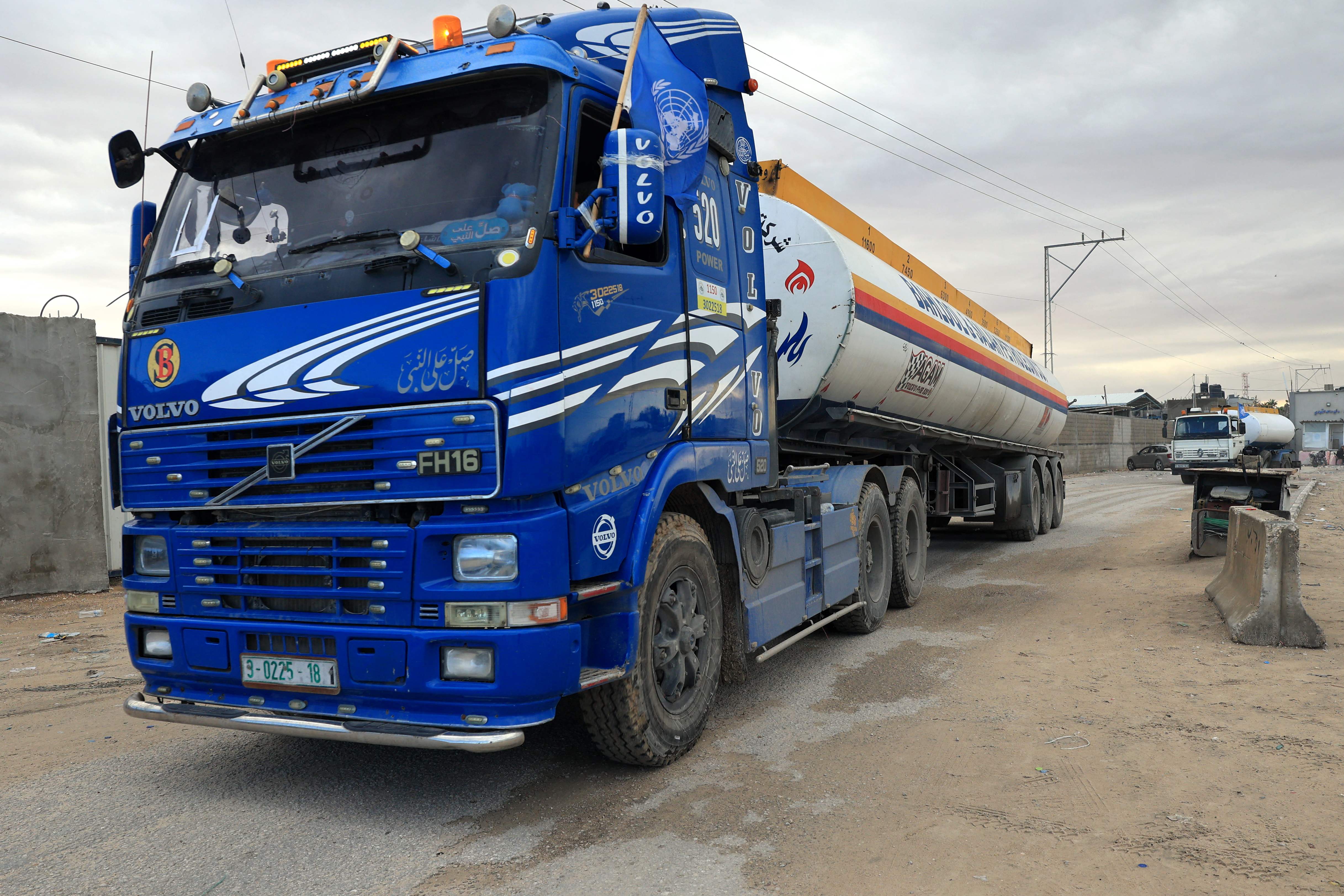Gunfire from Israeli raid on Gaza’s largest hospital leaves medics ‘unable to move between buildings’
Speaking to The Independent from inside al-Shifa, the head of the hospital’s burns unit says it is a ‘gamble’ to move as Israeli troops are still in the complex containing hundreds of patients and staff
Israeli forces have raided Gaza’s largest hospital, with doctors saying the gunfire has left it a “gamble to move between the buildings”.
The decision to send troops into the hospital is an escalation of the military offensive and may increase calls for a ceasefire, which Israel has so far resisted.
Witnesses said troops were searching wards and questioning people inside, having surrounded the complex where more than 2,000 patients, staff and people sheltering have been trapped without electricity and supplies.
Israel’s military spokesperson Rear Admiral Daniel Hagari said that troops were carrying out “a precise and targeted operation against Hamas in a specified area in Shifa Hospital” which the military claim sits atop a command centre and a network of militant tunnels. It is an accusation Hamas denies. Israeli forces were still inside the hospital complex on Wednesday afternoon, more than 15 hours after the raid started.
On Wednesday evening Israel said it found weapons and combat gear at the hospital. The army released a video that it said showed some of the material recovered from an undisclosed building within the complex, including automatic weapons, grenades, ammunition and flak jackets.
Hamas dismissed the announcement as “lies and cheap propaganda”.
Rear Admiral Hagari said the search would continue “in a precise way and in accordance with intelligence ... in order to gather more details and to discover more assets”.

Speaking to The Independent from inside al-Shifa during the raid, Dr Ahmed Makhalati, head of the hospital’s burns unit, said: “The situation is very difficult – the Israel army broke into the Shifa complex after various battles at the gates of the hospital.
“The soldiers are still inside the complex... the Israelis appear to be in one section of the hospital,” Dr Makhalati said, as gunfire could be heard behind him, but that it was difficult to see properly as it is “dangerous to take a look from the window [and] it’s a gamble to move between the buildings.”
“We cannot move from building to building [and] the situation is really tense,” he said. “The Israeli military is not in all the buildings.” He said that staff “haven’t heard about arrests, detentions or evacuations”.
International attention has been focused on the fate of hundreds of patients and more displaced civilians trapped inside the sprawling complex as electricity and supplies dwindle. Gaza officials say many patients including newborn babies have died in recent days as it has run out of fuel, leaving incubators without power.

The World Health Organisation, a UN agency, also said it was “urgently exploring” the possibility for evacuating patients and medical staff from the facility, alongside other partners.
“To make sure this can be enabled, of course there is a need for safe passage and also for fuel for the ambulances,” said Rik Peeperkorn, WHO representative in the occupied Palestinian territories. Mr Peeperkorn said that according to their latest information, 34 of 39 premature infants in the hospital were still alive.
Mohammed Zaqout, the director of hospitals in Gaza, said that Israeli tanks were inside the medical compound and that soldiers had entered buildings, including the emergency and surgery departments which house intensive care units.

Israel “stormed the buildings”, he told the Associated Press, adding that patients, including children, were terrified. “They are screaming. It’s a very terrifying situation ... we can do nothing for the patients but pray.”
A senior Israeli military official said Israeli forces engaged in gun battles with Hamas operatives outside of the complex but not within the hospital buildings, and a number of militants had been “neutralised”.
The military confirmed Palestinian reports that its forces had interrogated individuals inside al-Shifa, but would not comment any further.
“Our soldiers are making a slow and deliberate progress based on our intelligence. We are in direct contact with the health authorities in the hospital,” and IDF spokesperson said.

“Israel is at war with Hamas, not with the civilians in Gaza,” the official added.
The Israeli military said that the operation continued, with troops where they were conducting searches for “Hamas terror infrastructure an weapons” as well as hostages taken by Hamas during their deadly 7 October attack on southern Israel in which 1,200 were killed and around 240 were taken hostage back into Gaza. The Israeli army said their soldiers were accompanied by medical teams and had brought medical supplies and baby food as well as incubators and other equipment.
Rear Admiral Hagari said that military had repeatedly “publicly warned” Hamas against its continued military use of al-Shifa – an accusation Hamas denies.
“We gave ample time to stop this unlawful abuse of the hospital. The IDF has also facilitated wide scale evacuation of the hospital and maintained regular dialogue with hospital authorities,” he added.
Dr Makhalati said that “around 1am [local time] the Israeli military issued a warning to staff inside to move away from the doors and gates of the hospital as they will break in”.
“But there were various airstrikes and bombardments around Shifa hospital shortly before, causing a half metre hole in one of the departments where I think the soldiers entered,” he added.

The senior Israeli official said that they were still prepared to evacuate newborn babies to a different hospital within Gaza, Egypt, or Israel.
“This offer is still on the table,” he said, adding that they had provided the incubators to the hospital.
He said that Israeli troops left humanitarian supplies outside of the front gate of the hospital and had notified the hospital it was there.
Tedros Adhanom Ghebreyesus, director-general of the World Health Organisation (WHO), said: “Israel’s military incursion into al-Shifa Hospital in Gaza City is totally unacceptable.”
France, whose president Emmanuel Macron has urged for a ceasefire, expressed “serious concern” about Israeli operations inside al-Shifa
“The Palestinian population should not be made to pay for Hamas’s crimes, even less so the vulnerable, injured or sick and the humanitarian workers who courageously continue their work in extremely dangerous conditions,” the French foreign ministry said in a statement.
Martin Griffiths, the UN’s chief of humanitarian affairs said he was “appalled” by reports of the raid on al-Shifa. “The protection of newborns, patients, medical staff and all civilians must override all other concerns. Hospitals are not battlegrounds,” he wrote on X, formerly Twitter.
Hours before the raid, the United States said it had its own intelligence suggesting Hamas used al-Shifa and other hospitals – and tunnels beneath them – to support military operations and hold hostages. However national security spokesperson John Kirby said the US does “not support striking a hospital from the air”.

“We do not want to see a firefight in a hospital where innocent people, helpless people, sick people are simply trying to get the medical care they deserve,” he added.
In a press statement released on Tuesday night, Hamas rejected US administration claims about al-Shifa hospital and called for the establishment of an independent international committee to inspect all hospitals in Gaza.
Israel has vowed to crush Hamas. In response to the attack on 7 October, it launched its heaviest ever aerial bombardment of Gaza, with airstrikes continuing. Israeli tanks and ground troops were subsequently sent into northern Gaza, and in the last two-and-half weeks have claimed control of several key buildings and a central area in Gaza City.
Since Israel’s operations began 11,200 people, two-thirds of them women and children, have been killed, according to the Palestinian health ministry in Ramallah, in the occupied West Bank. Two-thirds of Gaza’s 2.3 million people have fled their homes.
About 2,700 people have been reported missing, with most believed to be buried under the rubble. The ministry’s count does not differentiate between civilian and militant deaths.
Egyptian security sources said that on Wednesday the first truck of fuel entered Gaza since Israel imposed a total siege on the enclave on 7 October.
The delivery was made possible by Israel giving its approval for 24,000 litres (6,340 gallons) of diesel fuel to be allowed into Gaza for use by UN aid distribution trucks, but not for use at hospitals, according to a humanitarian source.
Limited deliveries of humanitarian aid have been crossing from Egypt into Gaza since 21 October, but Israel had refused to allow in fuel, saying Hamas held plentiful stocks.
The head of the UN’s Palestinian refugee agency (UNRWA), confirmed that it has received fuel that crossed into Gaza via the Rafah crossing, but called for more to be allowed to enter the besieged territory.
“This fuel cannot be used for the overall humanitarian response, including for medical and water facilities or the work of UNRWA,” Philippe Lazzarini said in a statement. UNRWA needs 160,000 litres of fuel each day to complete “basic humanitarian operations”, he added.
The UN had warned in recent days that it would soon have to halt humanitarian operations, including the distribution of relief within Gaza, as its fuel stocks became fully depleted.
Join our commenting forum
Join thought-provoking conversations, follow other Independent readers and see their replies
Comments
Bookmark popover
Removed from bookmarks